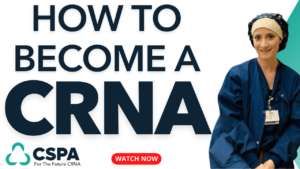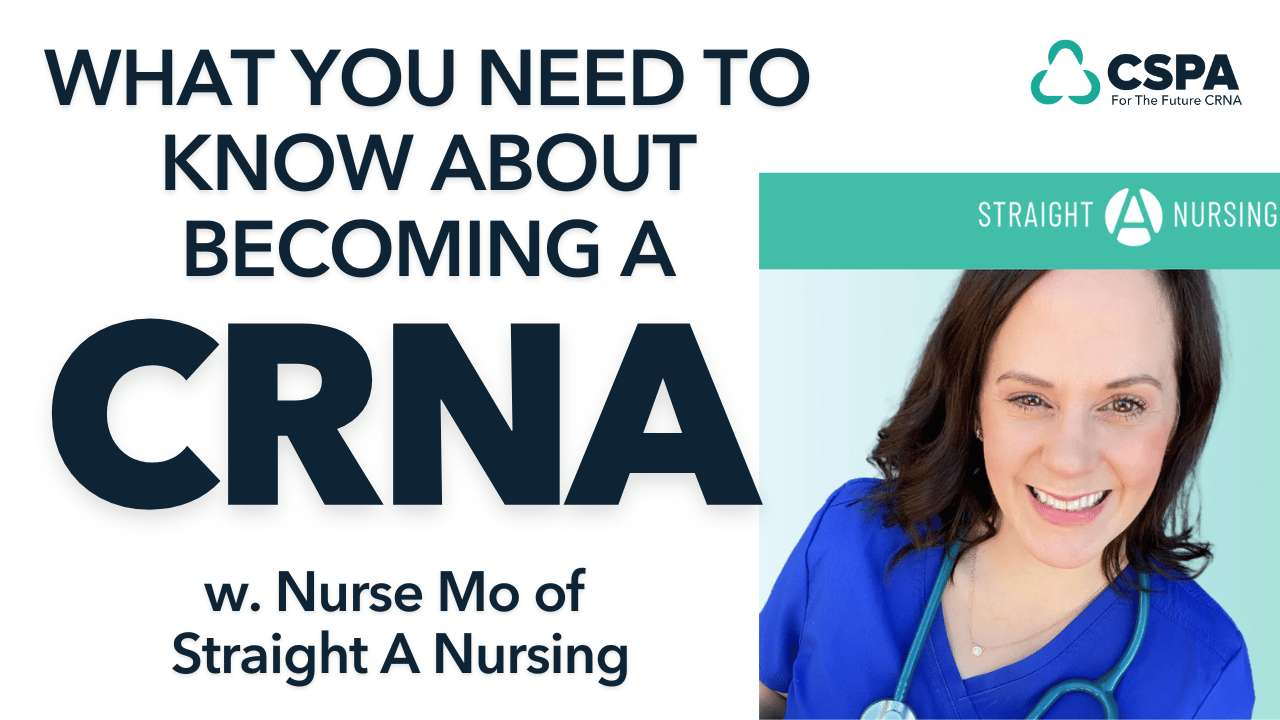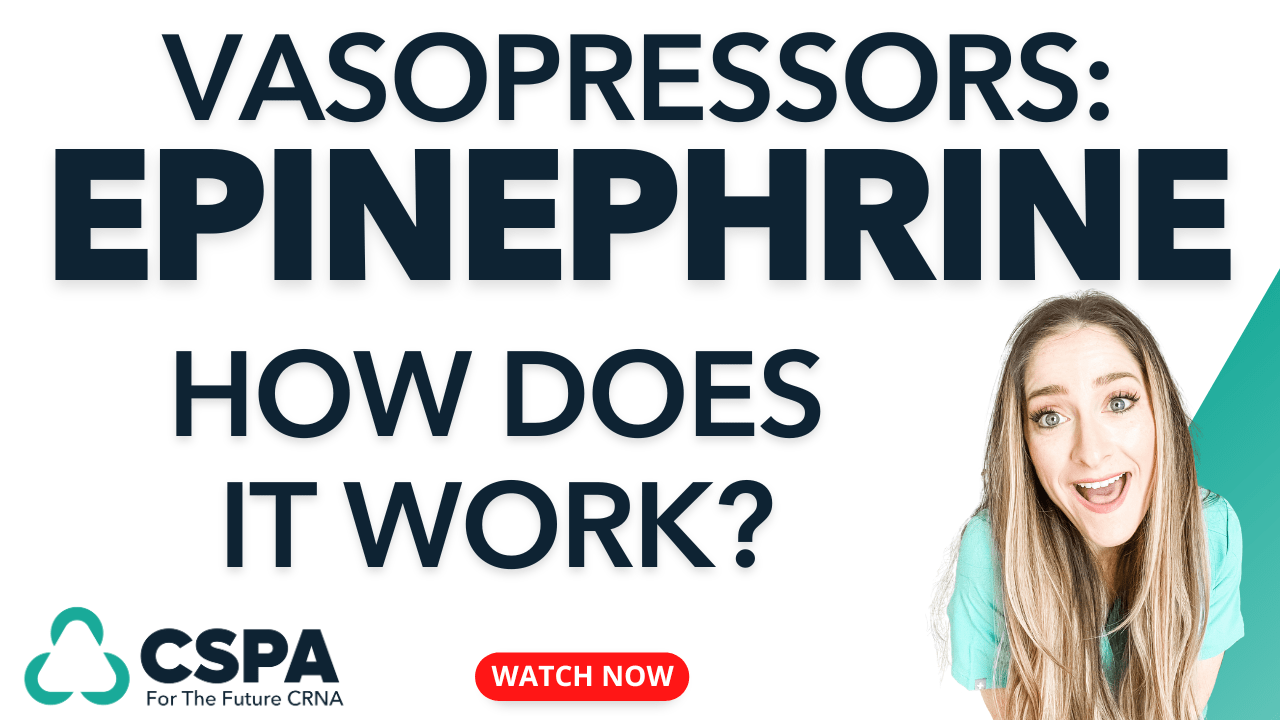
Get Your Free 8 Steps to CRNA Road Map Guide
The path to becoming a CRNA is undeniably not an easy one to take. But with guidance from those who have been on the journey before you, you can significantly make it less difficult and confusing. In today’s episode, Jenny Finnell gives a simple step-by-step process on things that you should be doing now in order to work towards your dream of becoming a CRNA. She breaks it down into eight steps, covering crucial information from getting good grades down to preparing for the interview. Discover all of these plus some great tips to cover your bases as you prepare to embark on this path. Join Jenny for everything you need to know regarding how to become a CRNA!
Thousands of nurses have gained CRNA school acceptance with CRNA School Prep Academy. Join today for access to all of the tools proven to accelerate your CRNA success! Click here:
https://crnaschoolprepacademy.com/join
Join the CSPA email list: https://www.cspaedu.com/podcast-email
Join the Free Facebook Community here! https://www.facebook.com/groups/crnaschoolprepacademyfree
Book a mock interview, resume or personal statement critique, transcript review and more: www.teachrn.com
FREE CRNA Shadow Documentation Form: https://www.cspaedu.com/j814jsxq
—
Watch the episode here
Listen to the podcast here
How To Become A CRNA
Everything You Need To Know About Becoming A CRNA!
In this episode, we’re going to discuss how to become a CRNA. This episode is for you if you are relatively new in the process of discovering the CRNA career path or maybe you’ve already discovered it and you’re ready to take some actionable steps but you’re getting overwhelmed. You want a simple step-by-step process on things that you should be doing now in order to work towards your dream of becoming a CRNA. Let’s go ahead and get into the show.
Step One: Become A Nurse
We’re going to discuss eight steps on how to become a CRNA. For reference, you can grab our full 8-Step Guide on how to become a CRNA. I definitely go into a lot of detail in that guide and it can help you stick to the path of becoming a CRNA. Without further ado, let’s go ahead and get into the steps. 1) When becoming a CRNA, it might seem obvious, but it’s becoming a nurse first. There are many pathways to becoming a nurse and so I’m here to tell you that any pathway will work. Ultimately, you have to end up with either your BSN or a BS plus an ADN. You have to be able to be a registered nurse and you have to achieve, again, either a Bachelor’s of some kind with an ADN or a BSN.
Keep in mind, if you choose a Bachelor’s in Science with an ADN, you’re going to be limited on what CRNA programs you can apply to because some schools do actually require a true BSN to be had, meaning an ADN plus a BSN or a four-year BSN from the start. Make sure you’re doing your research when looking into CRNA schools that you may be applying to, to see if they would consider an ADN plus a Bachelor’s in Science degree as a qualifying degree.
The majority of schools do accept a BS plus an ADN. However, you need to make sure that your school does so that way you are set to go in your pursuit of becoming a CRNA and my hope is that you don’t experience that roadblock down the road from the simple fact that you didn’t know that that was going to be an issue. Make sure that you’re researching what your school requires as far as getting your nursing degree.
If you become an LPN first and then you get your ADN and then your BSN, that’s okay. Ultimately, you want to end up having your BSN at the end of the road. The other alternative is getting an ADN plus a Bachelor’s in Science. If you’re doing an accelerated BSN program, that’s perfectly okay. You’re going to ultimately have your BSN, so the end result is getting your BSN, and that works.
There are two things to be considerate of when picking your Nursing degree. One is programs that are pass-fail. That’s a pretty big red flag, mostly because of what it does to your GPA. Be very wary of those programs. It doesn’t mean CRNA is impossible, but it’ll make your path a lot harder to achieve because it will knock your overall GPA closer to a 3.0. To be competitive for CRNA schools, you’re looking at a 3.5 overall GPA. The pass-fail programs can hurt because of what it does to your GPA.
Also, pay attention to your accreditation, whether it’s regionally or nationally accredited. I would say that a lot of schools are both regionally and nationally accredited. You are fine. A lot of CRNA schools are coming from or requiring national accreditation and if your school’s only regionally accredited, your school may or may not be able to take any transfer credits from that program.
That is not always the case, but these are things that you should be researching early. I believe this happened to a student that was going to schools down in Florida. I do know there are several schools in Florida that do not take regionally-only accredited BSN degrees. Make sure you’re looking at schools in your surrounding area and understand what accreditation they expect you to have with your Nursing degree.
If you’re early in your Nursing degree and you think CRNA is for you, I highly encourage you to get your foot in the door and start seeing what it’s like on a day-to-day basis, what it’s like being a CRNA. Get some shadow experience, talk to current students, try to understand this career path, and tune into the show because we want to make sure that if you pick this career path, you’re setting yourself up for success. If you find the passion for doing this, it’ll help you stick to the path and have the perseverance you’re going to need to be successful.
Early on, it’s important to find your why and understand why you are pursuing a CRNA. What is it about this career path that lights you up and understanding how that drives and motivates you both internally and externally? Internally, meaning what’s the personal reason why you want to choose this career path that is very personal to you?
What’s maybe more of an external, like a nice extra thing to have? Is it the lifestyle? Is it the financials? The personal reason is usually that it’s going to provide some type of lifestyle for your family, some security, or more enjoyment, fulfillment, and satisfaction in your career, whatever it may be. Try to understand what it is about being a CRNA that fascinates you to help you stay on that persistent path of becoming one.
Step Two: Get Good Grades
2) Grades. I hate the saying, “Cs get degrees.” I don’t know who started that, but it needs to end. I feel like there’s no easier way to hose yourself down the road. The thing is, when you’re 18 or 19 years old, you don’t know what the heck you want to be. I know you think you do and so embrace me. If you’re like, “It’s a little harsh,” but you don’t know who you’re going to be in 5 to 8 years. I promise you, in 5 to 8 years, you’re going to look back and say, “I’m a different person.”
Most people find that to be the case. To say at nineteen years old that you know for sure you never want to touch another book in your life, that you want to throw in the towel, you’re done with it, you’re setting yourself up for potentially a lot of hardship later on when you actually discover, “I’d like to go back to school. Now I have crummy undergrad education. That’s going to be hard to come back from.” Don’t do that to yourself.
I’m not saying beat yourself up and cry every day if you get Bs or if you don’t get As. Try your hardest to learn how to study while you’re an undergrad. Learn what works for you. Try new things. Explore new things and do the best you can. Don’t beat yourself up and don’t be afraid to seek out resources and help to make sure you get the grades that you need to be successful in your future.
Cs are not the end of the world. There is a pathway forward, but the more Cs, Ds, and Fs that you get in your undergrad, the harder and harder you will make your future journey become when it comes to not only CRNA but other graduate degrees as well. Be very careful with that. There’s nothing wrong with taking a semester off or two if you need some personal time for yourself. It’s better than getting a bunch of Fs. Keep that in mind. Being 18 or 19 years old in college is hard, especially if you’re moving away. Life happens too. I’ve had a lot of students tell me, “Jenny, my mom got sick. I dealt with this traumatic experience and it affected my ability to get good grades.” That’s completely understandable.
We all have hearts and feel but at the same token, schools need proof that you can perform academically so they know that you can be successful in their programs. If all they have to go by is the history that doesn’t show that, it’s not going to work in your favor. Early on, try to get good grades as much as possible, knowing that if you’ve had some bad moments or had some bad semesters, it’ll be okay.

Become A CRNA: Early on, try to get good grades as much as possible, knowing that if you’ve had some bad moments or had some bad semesters, it’ll be okay.
You’re going to have to prove yourself that you’re capable of getting good grades in very hard science courses, mostly graduate-level science courses. If you have some undergrad grades that are not the best, maybe you should retake those. That’s something to consider. It’s not always the case, but a lot of times it is. That’s something to start thinking about now.
Develop a relationship with your professors as well. That’s key to making sure that, again, you’re able to ask questions and get the help that you need to be successful. With grades, you’re looking at an overall GPA of 3.0. That is what most schools require. A lot of schools require a 3.0 overall and a 3.0 science GPA. However, there is a new trend that schools are now leaning towards a 3.2 science GPA or higher. It seems to be happening the most at schools that are eliminating the GRE, which is the Graduate Record Examination. It’s like a graduate entry exam.
Schools who have been eliminating that test because, statistically, it has not proven to correlate with the success of their students, are now saying, “We won’t require that, but now we’re going to require a higher science GPA.” What is a science GPA? Science GPA is your core sciences, your hard sciences, which occur outside of the College of Nursing. Things like Biology, Math, Chemistry, and Anatomy Pathophysiology.
They’re usually the prereqs you do leading up to your nursing school acceptance. They’re usually the classes you take to get your ADN, not your BSN. I have a lot of students who say, “I have a 3.0 on my ADN, but I had a 4.0 on my BSN, so my overall is about 3.5, so I’m okay.” Unfortunately, your ADN probably has a lot of your core sciences and if that’s under a 3.0, you’re more than likely not going to be considered for an interview for CRNA school. Looking at and assessing your GPA and breaking it down between the overall last 60 credits and your science GPA is key to understanding where you fall.
I’m recording this very early. I’m pre-recording episodes because I’ve shared in the previous episodes that I’m going to be hospitalized, not because I am sick, but because I’m pregnant with twins and they’re very high risk and they have to be watched very closely until delivery. Hopefully, we have two healthy baby girls by the time you read this. All that being said, I’m pre-recording this and we’re working on revamping our website. I’m hopeful it’ll be done by November 2023.
If you go to our website CRNASchoolPrepAcademy.com, we do have a GPA calculator. That calculator is mostly a tool used to see if you qualify to apply to our guarantee program, which is that we guarantee CRNA school acceptance. It’s a process for that, but it might help you at least get an idea of where you stand. I do encourage you to go use that free tool over on our website. If you look at our join packages, it’d be the Guarantee program. You would find the GPA calculator there. I do recommend that.
Figuring out where you stand with your GPA is key. If that calculator is not enough for you or if you’re still confused, I do encourage you to reach out to future CRNA program faculty to get some guidance on that. You can also utilize resources on TeachRN.com, previously called Nurses Teach Nurses, and you can book a transcript there if you can find a CRNA faculty who provides that. Assessing your grades and your transcripts is key to knowing how to move forward. Getting a head start on this sooner than later is so important. It can take a long time to make up for potentially previously bad grades.
The average CRNA school acceptance GPA is right around 3.5. Some schools are much higher than that. Some schools are a little lower than that. I’ve never seen a school with an average of less than 3.4. I have seen schools as high as 3.7 or 3.8, which is staggeringly high. Know that the average across 130-some schools that are out there is right around 3.5.
If you know your GPA overall in science is more like a 3.0 or 3.1, maybe looking at the schools that have an average GPA of 3.4 would give you a better shot at being considered for an interview versus applying to the CRNA schools who have an average GPA a of a 3.7 or 3.8, understanding, again, what these schools are heavily weighting when looking at their CRNA applicants.
Step Three: ICU Experience
3) ICU experience. I have an entire episode that I did on ICU experience, so I encourage you to go back and read that for a more thorough explanation of the ICU experience for CRNA school. However, the biggest takeaway is considering peds or adult ICU is key because, again, not all schools will take pediatric experience. Making the best decision on whether you should go the adult or peds route, make sure you put your best foot forward when applying to CRNA school and avoid questionable units like the ER, Cath lab, PACU, and OR. ICU float pool can be questionable at times.

Become A CRNA: Considering peds or adult ICU is key because not all schools will take pediatric experience.
While I wouldn’t say ICU travel is questionable, as long as you go into traveling as an ICU nurse with high acuity experience such that you do advance life modalities, such as ECMO, CRRT, and things of that nature. If you get trained on those modalities and you are able to request Level 1 trauma centers only as an ICU traveler, you should be okay. The only other thing to keep in mind with traveling, though, is getting letters of reference from a current nurse manager can be difficult. I do find that a lot of travelers have to settle on a home base to ensure that they are getting a solid letter of reference from an ICU manager.
That is something also to keep in mind if that’s in the future for you. Picking the ICU experience that is high acuity, that’s the most important. It’s all about quality over quantity. You want to make sure that you’re getting the best experience possible, getting leadership experience, and getting advanced lifesaving modalities such as ECMO or Prisma.
Also, dealing with vasoactive drips, and ventilators. You should be seeing a ventilator, if not every shift, at least a couple of times a week. You should be having a patient on a ventilator. If the majority of your patients are not on a ventilator, I would be questioning the acuity of the ICU. Also, vasoactive drip. It’s the same thing. You should be dealing with that every single week that you’re working in the ICU. You should have some type of vasoactive drip. Assessing the acuity of your ICU is key.
Do patients get shipped out of your ICU? If you’re still in nursing school, one of the best ways to explore this is a start getting experience as a nurse’s aide. It also happens to be a great way to get your foot in the door to get into an ICU residency program as a new grad or get hired directly into the ICU. Typically, without nurses’ aid experience in the ICU prior to graduation, you’re going to find it to be way more difficult to be able to land a new ICU new grad position. Do yourself a favor and get a nurse’s aide job in the ICU now so you can set yourself up for success down the road.
Step Four: Leadership Roles
We’re on step number four. 4) Leadership roles. This can start in nursing school. You can become part of your student nurse association. that’s a great way to get involved early on to show long-standing leadership roles. As you become a nurse, look to precept. Look to be a charge nurse. You can even become a nurse manager. Be careful if you’re a nurse manager that you’re still actively doing patient care or that if you moved into the role of a nurse manager, that again that’s not the extent of your ICU experience because, a lot of times, nurse managers are not doing direct patient care.
Being a nurse manager is great, but make sure that you’re also still providing patient care and getting that experience because CRNA schools could question that when you’re trying to become a CRNA. Charging, precepting, all those things are great. The committee works great. Volunteering is great. It doesn’t have to be medical-related volunteering. Any type of volunteering that shows your commitment to the community is great. You can do medical mission trips if you want if that floats your boat. Just know that it doesn’t have to be that. It could be whatever you are passionate about. It could be a local food bank.
I talked to someone who, again, was an avid gardener and she grew vegetables and fruits and then donated those vegetables and fruits to a local food bank. that’s a great way to get back to your community. Whatever you find is passionate, that’s going to light you up, they’re going to see that when they talk to you about it in the interview if they mention it.
Also, if you put it on your resumé, it’s going to show that you care about the community. As a nurse, nurses are passionate about people and community is people. Community involvement in any way is a sign that you truly are a passionate nurse and truly a leader within your own community. It doesn’t have to be a nursing role per se, but it definitely shows your passion for your profession.
Nurses are passionate about people, and community is people. Community involvement in any way is a sign that you truly are a passionate nurse and a leader within your own community. Click To TweetStep Five: Shadowing
5) Job shadowing. I mentioned this already, but this step is so important. Unfortunately, I see a lot of people wait to do this until they’re already actively in the application phase. Maybe they’ve done it in the past, but they never documented it. They don’t have any memory of who they shadowed or what their name was or anything. That’s unfortunate because that’s a valuable experience. You should have documentation. You should remember that CRNA’s name.
If this catches you in time, make sure you are jotting those things down. I have a free documentation guide that you guys can use to document your shadow experience. Also, keep in mind that your CRNA program may have one too. I highly recommend that you check their website first to see if they offer their own shadow form for you to fill out. If they don’t, then use the one that we provide. Any documentation is better than no documentation.
Even if you don’t use ours, document it on a piece of paper. It’s totally fine. After the shadow experience, if you forget, you can ask for a letterhead from the anesthesia office, document your experience there, and have the CRNA sign at the end of the day. Document because these are important moments in time that you want to make sure you’re getting credit for.
The earlier you shadow, the more persistence it shows in your pursuit of becoming a CRNA. If you only document one shadow experience and it’s right before your application is due, they may not even know that you had several other shadow experiences. Make sure you’re documenting this on your resumé as well. Get credit for those experiences that you have early. Early and often is key. You can see your growth and understanding of this career path and see how it evolves. It also will help too to see different areas or different ways of providing anesthesia.
I’ve heard this a lot, too and I want to clear the air on this. I’ve had people and I’ve even had CRNAs tell me this, which is unfortunate. We work hard to try to find our student shadow experiences. We’ve reached out to hundreds of CRNAs at this point from all across the country, trying to find shadow experiences for our community because sometimes it’s a very hard thing for our students to find.
They’re afraid because they are afraid to get blacklisted at their hospital for wanting to be a CRNA, which is ridiculous, but unfortunately, it happens. They’re afraid of their coworkers seeing them or whatever it is, so they don’t want to shadow where they work. By the way, the easiest way to shadow is to shadow where you work, whether that’s a nurse’s aide or the nurse. Otherwise, you got a lot of hoops to jump through with paperwork with HIPAA and all other stuff. Shadow where you work if you can.
If you can’t, don’t be afraid to take an outpatient surgery center experience. Don’t be afraid to take an experience that maybe isn’t at a high acuity hospital. I had someone tell me they turned down a shadow experience because they didn’t think it was going to be a good experience. I’m like, “Any experience is better than no experience.” I’ve had CRNAs turn down offering shadowing where they work because that they don’t have a good experience for their student because they work at a surgery center.
I’m like, “Our students will take anything that you’re willing to provide them.” Seeing how a CRNA operates in a surgery center or the ophthalmology clinic is still providing anesthesia. It’s still a great experience because you could take that experience and see how a CRNA provides anesthetics at a dental clinic. Maybe a year later, you can go see how a CRNA provides an open-heart case. It gives you a nice variety to see, “They do this and this.” you should never turn down a job shadowing experience, even if you think it’s not the best.
I’m also saying if you shadow an MD, that’s okay. It’s still an anesthesia experience. It’d be a preference if you were with A CRNA. However, if that’s all you can come by because you work in a location or a state that that’s what you have nearby, then take it. Schools will understand. It doesn’t mean to stop seeking out additional opportunities to shadow a CRNA, but again, don’t turn down an opportunity if you get one no matter who it’s with. Take it.
Step Six: GRE/CCRN
6) GRE/CCRN. Some schools are eliminating the GRE completely because it hasn’t been proven to be statistically significant in the success of their students passing boards for the first time. However, some schools still do require it. The schools that no longer require it, sometimes still require it for students who have a GPA less than a 3.6, a 3.3, or a 3.4. It depends on the program. Sometimes the GRE is still required for certain applicants but not all applicants.
You’re looking at the average range of what they’re looking for you to score is between 300 to 310. Usually, the minimum is lower than 310. I’ve never seen a minimum at a 310. I’ve seen a minimum at 305 before or a recommended. It’s not even the minimum, but a recommended 305, but that’s pretty high. Most schools are recommending 300 minimum. I have seen as low as 297, but that’s probably the lowest I’ve seen as far as the minimum score. Keep in mind that most CRNA applicants are going to have a 305 or higher on the GRE. The average will have about 305, so that’s where you want to aim.
It’s a hard test. I’m not going to lie. It’s not fun. Some people can breeze through it. Other people, myself included, struggle with it. Don’t wait until the last minute to take that test. It does have to be within the last five years. Don’t take it too early because it typically has to be within the last five years. Don’t wait until a couple of months before your application to take that test because you may find yourself needing to retake it. Sometimes paying for a tutor, it can take several months. Make sure you’re planning ahead for that test. When you’re looking at writing, you’re looking at getting a four to four and a half on writing is what schools are typically looking for these days.
Most applicants have right around a four on the writing. For the 300 score or 310 or whatever you end up getting, they break that down into quantitative and qualitative. The quantitative is the math section, like the science and math section. The qualitative is like the verbal section. Verbal, you’re going to be anywhere in the 150 range, 152, or 153. For the quantitative, you want to be at least 155, 154, and 150 is technically below average overall if you look at everyone who takes the GRE. Even if you got a 150 and a 150, cool. You met the 300 mark. That’s good. You want your math and science section to ideally be 154, if not higher, so you can at least score average, if not a little bit above average on the math portion of that test.
The CCRN, you’ll get a pass-fail, but they do score you. If you score below a certain amount, you’re going to fail. Some schools want you to report your score. Keep that in mind before you take that test. You want to go into that test, putting your best foot forward in case your school has your report, not only your scores but your sections. They might even want you to report your sections, like how you did on cardiac, neuro, and whatever. It could be an important test to help them decipher how strong your critical care knowledge is. Don’t just wing it. Take it seriously. That’s my best piece of advice for that. Make sure you’re taking the CCRN seriously the first time you take it.
Make sure you're taking the CCRN seriously the first time you take it. Click To TweetUnfortunately, I’ve heard people say, “I’ll take it and wing it and see if I pass. If I don’t pass, then I’ll study.” Don’t do that. Don’t do that with a GRE either, because it’s expensive to take these tests and it’s defeating to not do well. Also, these schools may be looking very specifically at your scores and you don’t want to do that to yourself. You want to make sure you’re putting your best foot forward going into these tests.
Step Seven: Taking Graduate-Level Courses And/Or Prerequisites
7) Taking graduate-level courses or the prerequisites or both. Prereqs could be things like Grad Stats and Anatomy Pathophysiology. Some require Physics. Some want you to have an O Chem. Some of these classes are going to be graduate-level courses. Some of them are going to be undergrad-level courses. They don’t usually have you take graduate-level chemistry. Take a deep breath.
Usually, the chemistries are not at the graduate level, but maybe you’ve never had an O Chem course and maybe they require that. Maybe you’ve never had an algebra course and they require that at an undergrad level. There could be some additional coursework that you have to do that was not included in your Nursing degree, but they do require. Researching this well in advance is going to serve you very well. I was able to take a graduate-level course in my undergrad. I did have to get special permission to have it count towards a graduate-level credit. The fact that I hadn’t even graduated with my BSN, but I was eventually able to do that.
I had extra space in my fifth year, senior year. I was able to do a graduate-level of stats course my senior year because I had tons of space in my schedule. That was nice to get that out of the way while I was still full-time in school essentially and not working all the time. It allowed me to do other things when I was done with school. Keep in mind that you can maybe even work that in ahead of time if you’re able.
Step Eight: Interview Preparations
Last, but not least, 8) Interview preparation. I know you’re like, “Really? That’s a step to becoming a CRNA?” It should be included in the steps because the interview preparation, in my opinion, should start very early. When you first start your ICU position, you should be the scientist and ask why and not just accept the protocols or the status quo. “They told me to, so I will.”
You should be understanding why. Think back to how a toddler is like, “Why?” That’s what you need to do. Think like a toddler and ask why. You’ll get more out of your ICU experience and you’ll be way more prepared for the interview process and CRNA school in general. Starting the interview preparation doesn’t have to be large. It can be very small little things done over time that are going to set you up for success down the road.
Studying at work is a great way, not that you crack a book and read chapters and chapters, but if you have a drip, a new drug, or a new pathophysiology process, take a quick second to Wikipedia and then print it out and create a binder. Practice different CCRN-style questions ahead of time or challenge yourself with emotional intelligence-type questions and figure out who you are. As a young adult, I feel like you spend a lot of time focusing on how you want to be seen, but you shift as you get older with realizing how others see you versus how you want to be seen. It’s very insightful when you think, “This is how I want to be seen, but how do others see me?” You may be surprised. They don’t always correlate.
As a young adult, the sooner you start trying to look at that from the lens of someone else, the more insight you’re going to get into different areas that you could potentially work on to grow and improve upon. We all have areas of weakness that we can improve upon within our personality. Assess how you get along with coworkers at work. Assess how you handle stress and conflict and understand how you handle difficult patient situations and or difficult doctors or whatever it is. Start making a mental record of this.
One of the things I wish I would’ve done because it would’ve helped me in my first year in school interviews that I didn’t do, it backfired but you learn, was when I had a difficult situation at work, whether that be with a coworker or an attending or a patient, is to document it. Not all the HIPAA stuff, not patient names, but the experience and what came of it because if you’re going to be like me, you’re going to forget in a hot second.
When you try to reflect on it, you’re like, “I don’t know. I just know it worked out.” The details become muddy. If you reflect on it while it happens and keep a journal of stuff like that, when it comes time to prepare for your CRNA interview, you’re going to be very well-versed. They say, “Tell me about a time you had a conflict with a coworker and how did you handle that?” You’d say, “This is a great question because I’m prepared. I’ve documented several of these experiences.”
The documentation can also see help you see your growth. Look at some of the first difficult experiences you had to some of the more recent ones and see if they had a better outcome or if you felt better with the outcome. Now you’ve had a lot of experience handling those types of situations and you feel better about how you do handle them. Why is that? Self-reflection is huge. It’s equally included in step number eight to prepare yourself for the road ahead.
I hope you guys enjoyed this episode. Thank you so very much. I appreciate you. Remember, you can get both the shadow documentation form if you need one and you can grab our 8 Steps to Becoming a CRNA Road Map that goes into a lot of these steps in a lot more detail than I shared with you in this episode. I hope you grab it and you all take care. Until next time.
Important Links
Thousands of nurses have gained CRNA school acceptance with CRNA School Prep Academy. Join today for access to all of the tools proven to accelerate your CRNA success! Click here:
https://crnaschoolprepacademy.com/join
Join the CSPA email list: https://www.cspaedu.com/podcast-email
Join the Free Facebook Community here! https://www.facebook.com/groups/crnaschoolprepacademyfree
Book a mock interview, resume or personal statement critique, transcript review and more: www.teachrn.com








